161 CD / Johann Sebastian Bach: French Suites BWV 812 – 817
Description
There is little to say about the skill of Evgeni Koroliov, the Russian pianist who has settled in Germany, which has not been said already. Ligeti’s famous saying that he would choose to take Koroliov’s recording of the “Art of Fugue” (TACET 13) to a desert island, where he was "lonely and thirsting", has been frequently quoted; and Koroliov’s almost unbelievable capability of expressing each part in a polyphonic piece as clearly as if it were an individual person has been given many accolades. Those listeners who love his piano performance, and his Bach in particular, need no explanations of how subtly he expresses the nuances of the mood of individual moments and even individual notes. It is for all these people that he has made a new recording of Bach’s French Suites – two CDs for the price of one.
10 reviews for 161 CD / Johann Sebastian Bach: French Suites BWV 812 – 817
You must be logged in to post a review.

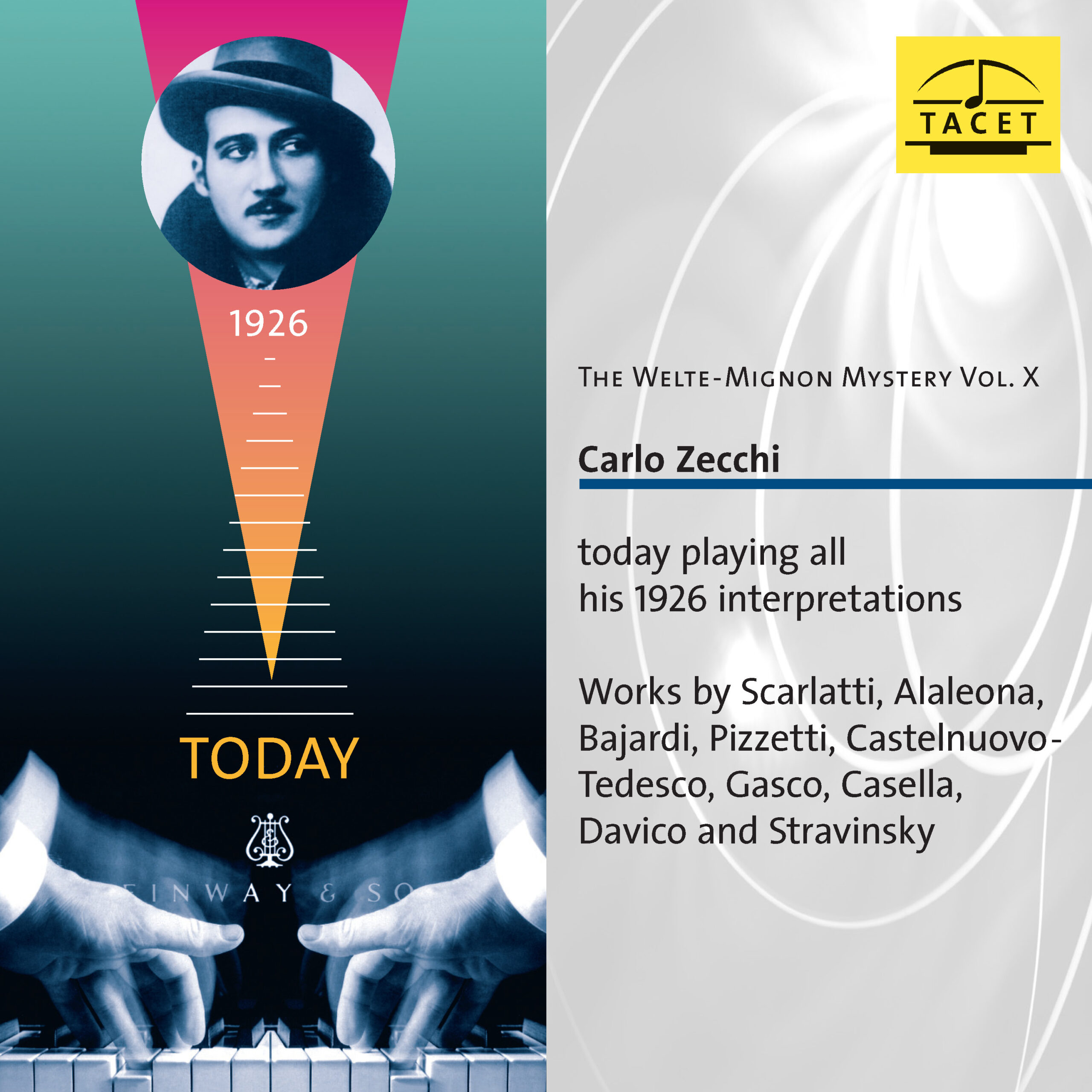
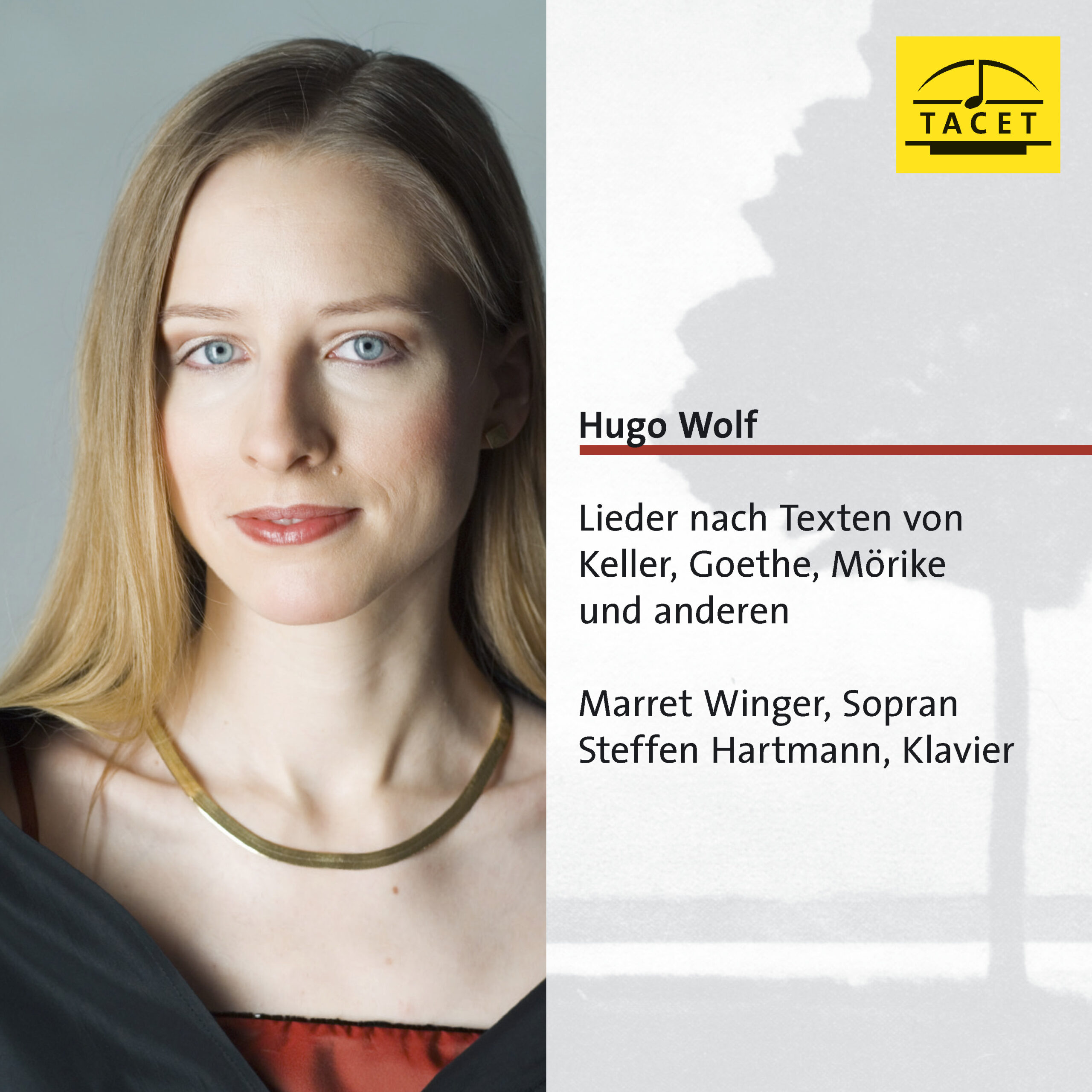
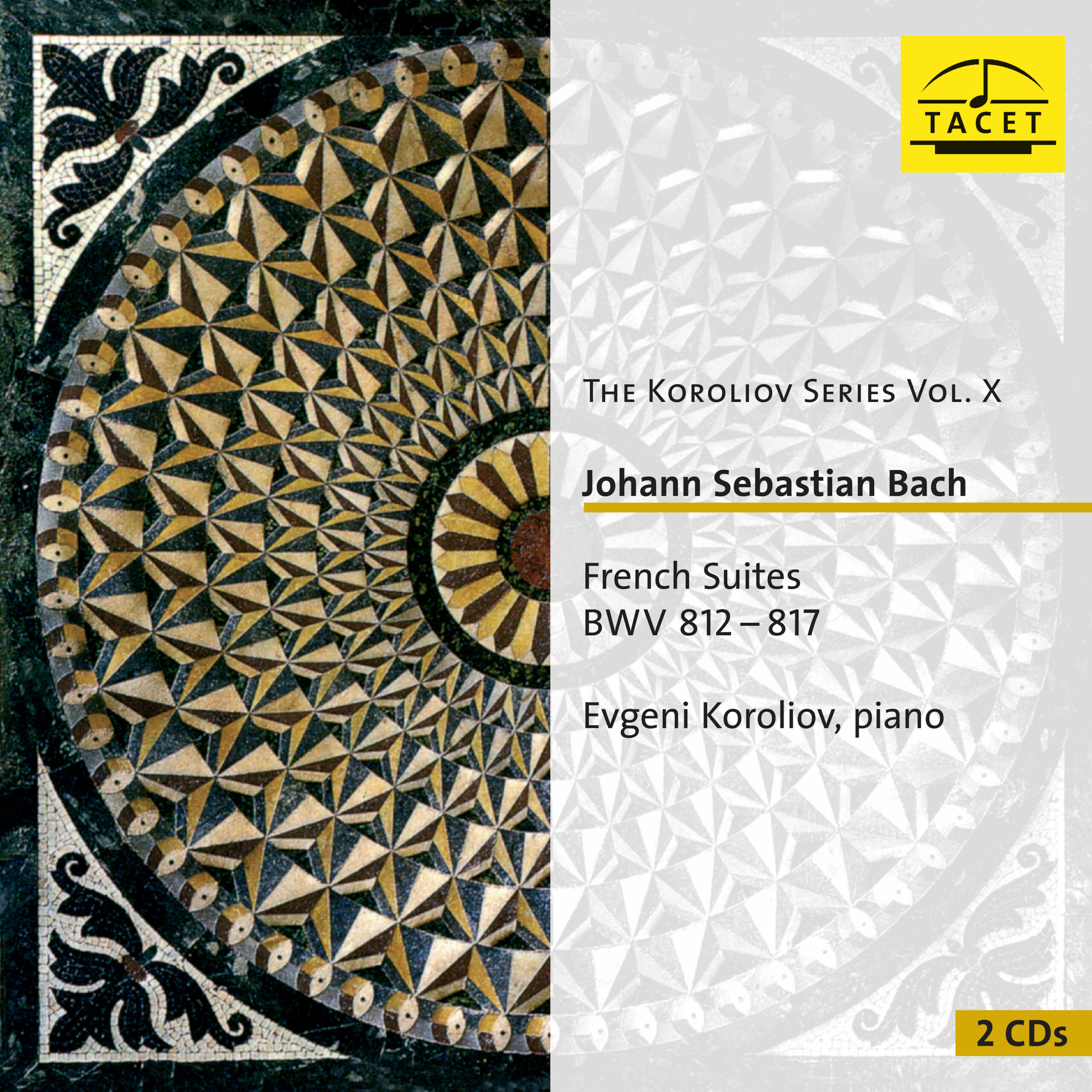
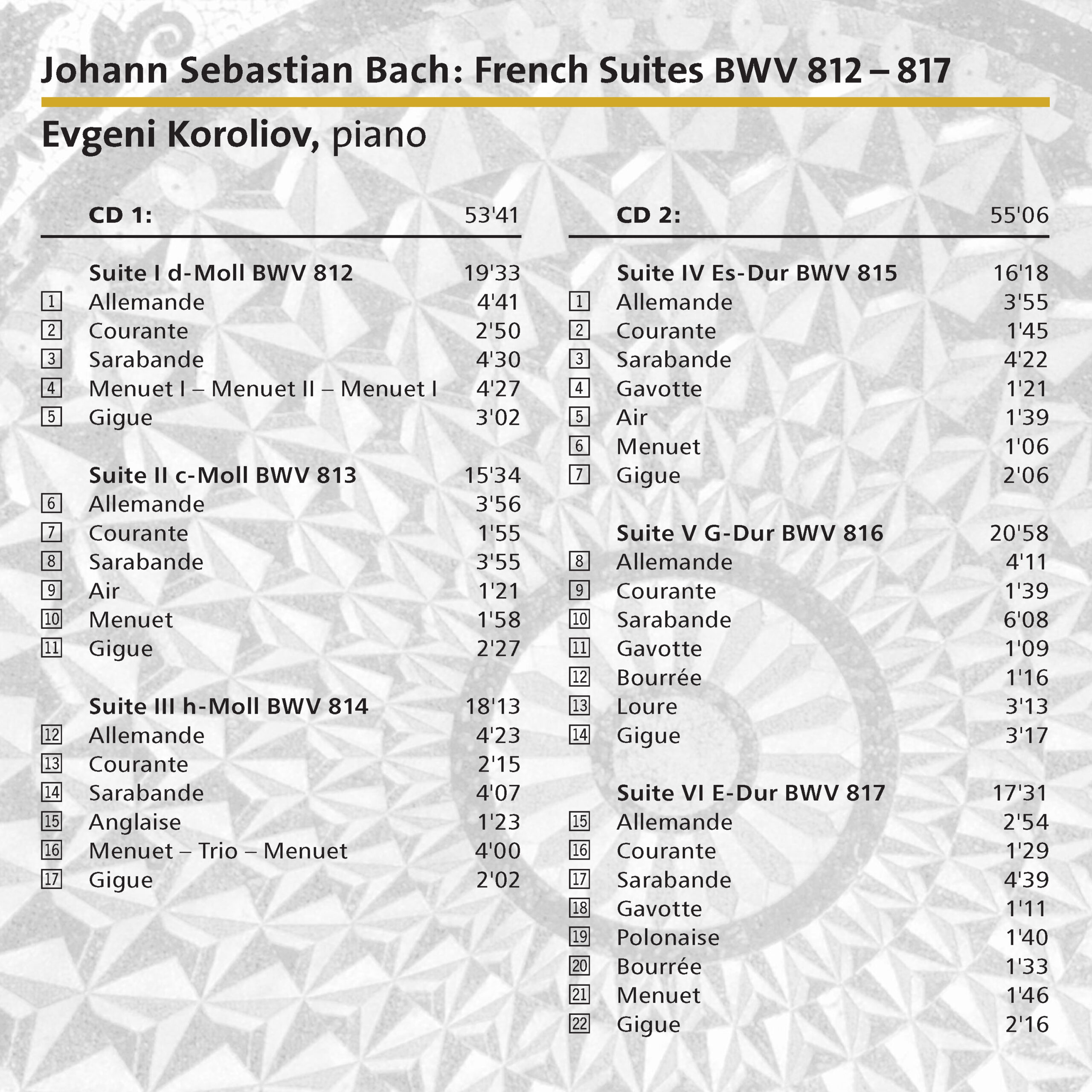



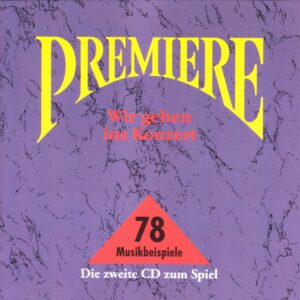
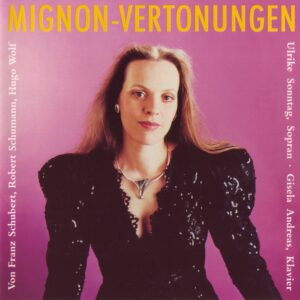
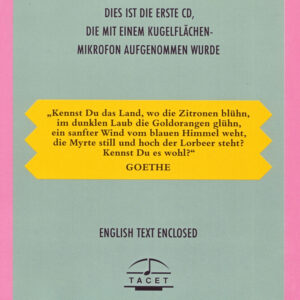
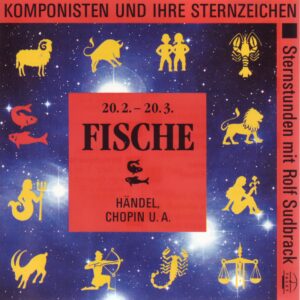
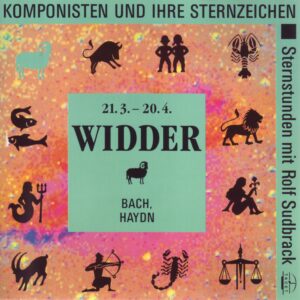
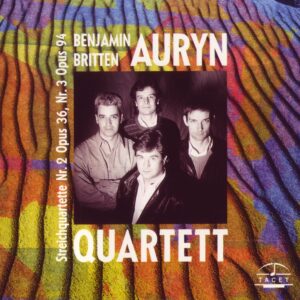
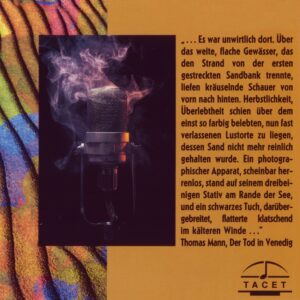
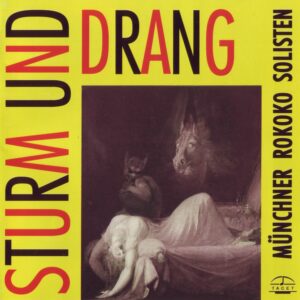

radio K1 –
Johann Sebastian Bach’s great Passions are monuments of music history. But of course, Bach did not focus solely on grand forms—he was also a master of the concerto, the solo instrument, and smaller forms, often compiled into cycles. Whether in the French or English style, Bach did not merely feel at home in the traditions of his time; he transformed them into works bearing his personal signature. The finest example: the French Suites, BWV 812–817. While they may not hold the top spot in the popularity of Bach’s keyboard works—that place belongs to The Well-Tempered Clavier—they contain true gems of great beauty. Let me just say this: even with such works, one can meditate through listening. And Evgeni Koroliov’s recording for the TACET label makes this possible. His interpretation embodies a profound clarity, even an abyssal depth, intertwined with French nobility. While it may not eclipse the recordings of renowned names, it certainly takes its place among the distinguished ranks. The high technical standard of this recording further secures it a privileged position. Now, simply listen with me—calmly—and let yourself be drawn into this music, these beautiful sounds, and this artistic excellence.
Pizzicato –
Russian pianist Evgeni Koroliov’s Bach interpretations have achieved cult status, and this latest recording will only reinforce that reputation. The way he combines a fundamentally Romantic sensitivity with a compellingly clear and ultimately pianistically restrained approach is astonishing. The concentration radiating from the music compels the listener to follow along, as even the most complex passages are presented with fascinating simplicity. Where other interpreters emphasize dynamics, ornamentation, accents, and layer upon layer of color, Bach’s world unfolds here with a rarely heard richness of the most delicate nuances. Somehow, one feels as though intruding on Bach’s intimacy, almost afraid to disturb it, listening on—deeply moved and as if hypnotized.
RéF
Concerti –
The mystery of great music
Evgeni Koroliov has recorded Bach’s French Suites.
The wonderfully soothing tranquility and the tender, loving care of Evgeni Koroliov’s playing, along with his analytical depth and boundless illumination of the contrapuntal intricacies in Johann Sebastian Bach’s French Suites, make one completely forget that he is, of course, playing a modern Steinway rather than a historical harpsichord from the Baroque era. His approach to the Thomaskantor’s music feels authentic nonetheless. Koroliov serves Bach with objectivity and humility, yet his playing never feels distant—instead, it reveals the true greatness of Bach. Born in Moscow in 1949 and now based in Hamburg, where he successfully trains the masters of tomorrow at the local music academy, Koroliov builds his interpretations on quiet and wise tones. He is on the trail of the mystery of this great music. Where Bach’s spirit and craftsmanship unite so ideally, Koroliov proves himself a brilliant re-creator, embodying both thinker and doer in perfect harmony. Infused with the master’s divine clarity of thought, Koroliov’s Bach unites intellectual comprehension and sensual playing in their golden mean.
Peter Krause
Klassik heute –
Top marks—"10 out of 10"—for artistic quality, sound quality, and overall impression.
In piano circles, it’s said that every pianist eventually finds their way to Bach. Evgeni Koroliov, born in Moscow in 1949, performed The Well-Tempered Clavier in its entirety—from memory, of course—in his hometown at just 17 years old. Since then, he has repeatedly presented Bach’s major works for keyboard in public and, in 1990, earned the highest praise for his recording of The Art of Fugue (Tacet 13). The composer György Ligeti even selected Koroliov’s recording as his personal “desert island disc,” declaring that he would listen to it “again and again, even if starving and thirsty, until his last breath.” In 1999, Koroliov released the Goldberg Variations on Hänssler Classic, followed in the Bach anniversary year 2000 by both volumes of The Well-Tempered Clavier (Tacet 93 and 104).
It comes as no surprise that Evgeni Koroliov’s previous Bach recordings have become reference interpretations. Few traverse the jungle of Baroque polyphony with such sovereignty and deliberation. With the French Suites, he achieves the remarkable feat of elevating the listener to a near-transcendent level. Koroliov breathes life into the obligatory framework of the dance sequence—Allemande, Courante, Sarabande, Gigue—into which Bach inserted additional dances like Menuet, Gavotte, Bourrée, Air, Anglaise, Polonaise, and Loure to enhance the individual character of each suite. He does so through extreme, yet never inorganic, tempo variations. Certainly, Koroliov occasionally replaces the measured, dance-like character of some Sarabandes—such as in the fourth suite—with a purely meditative quality. Some might criticize that many of his interpretive choices lack not only forward momentum but also temperament, and that certain passages can feel almost overly literal.
While Bach may have been familiar with the steps of the once-popular social dances, most had fallen out of fashion by his main creative period and survived only in art music. Koroliov’s abstraction and objectification of the musical material are therefore entirely justified. The fact that a more "down-to-earth" interpretation is also possible is irrelevant, because the philosophical depth he draws from these seemingly simple dances is utterly convincing. Just listen to the Menuet from the 3rd Suite, transformed into a spiritual exercise. Suddenly, it becomes clear why these six suites—which often stand somewhat in the shadow of the more intricate English Suites—truly deserve the name "French": they appeal directly to the civilized essence within us.
An essential element of Koroliov’s playing—controlled yet entranced—is his immense inventiveness in ornamenting the repetitions of each formal section. The Hamburg piano professor reveals his intimate knowledge of Baroque stylistic sensibilities, which once culminated in the improvisational artistry of opera singers. His crystal-clear, never harsh touch, along with his talent for highlighting overarching connections through precise accents and impeccable timing, calls to mind the legendary Russian pianist Samuel Feinberg. Feinberg’s Bach recordings from the 1950s suffer from poor sound quality, but the recording technique of these French Suites is ideal. Like an acoustic magnifying glass, it draws the listener into the very structures of the music. Once again, one could not arrive at Bach in a better way than through Evgeni Koroliov.
Richard Eckstein
Stuttgarter Zeitung –
Von letzten Dingen
It has been 18 years since the Stuttgart label TACET released Bach’s Art of Fugue in the recording of an almost unknown Russian pianist. For György Ligeti, this was the one CD he would take to the famous deserted island; he declared that he would want to listen to it “until his last breath.” Today, Evgeni Koroliov has established himself among the great pianists, and Bach’s works still form the center of his artistry. After the Goldberg Variations and the Well-Tempered Clavier, the French Suites have now appeared as a double CD, once again confirming the rank of this exceptional pianist. Koroliov once said that he did not believe it more valuable to give expression to the individual than to the universe. Indeed, under his hands Bach’s counterpoint appears as an emanation of spirituality: music as a revelation of ultimate things—which, in turn, is a profoundly Romantic stance. Listening to this recording is a fascinating experience: Koroliov traverses the cosmos of the suites with complete ease, illuminating every motif and every phrase. Above all, contemplative movements such as the Sarabandes and Allemandes become quasi-absolute music without losing their particular formal character. Koroliov is, and remains, an unpretentious mystic.
(fab)
Piano News –
For quite some time now, the unassuming pianist Evgeni Koroliov has no longer been considered an insider’s tip. His interpretations of Bach have set new standards, and composer György Ligeti’s remark that he would take Koroliov’s recording of the Art of Fugue with him to a deserted island “lonely and dying of thirst” has by now become almost legendary. To complete his Bach compendium, Koroliov has now recorded the French Suites for the TACET label, following his interpretations of the Art of Fugue and the Well-Tempered Clavier.
For all Koroliov fans, this is an enrichment, for once again the Russian pianist’s playing possesses a suggestive, almost magnetic pull that is rarely heard. Under his hands, the music unfolds with deep soulfulness and a touch of magic. This becomes especially evident in the Second Suite in C minor. And yet, everything sounds plain and simple. But therein lies the difficulty: to interpret the score, with its dense web of relationships, in a way that is transparent without becoming cold.
Koroliov seems to sense and illuminate every single note, thereby revealing the pure beauty of the music. He shapes the movements with elegance and a touch of dance-like verve, always maintaining the right balance, avoiding both dynamic monotony and interpretative excess.
The suites, which follow the sequence of five French dances—Allemande, Courante, Sarabande, Minuet, and Gigue—were composed by Bach as teaching material, three in major and three in minor keys. The calm assurance with which Koroliov unites this didactic purpose with pure poetry is unique. In short: a marvelous recording!
Anja Renczikowski
Classica-Répertoire, mars 2008 –
Composed by Johann Sebastian Bach for use within his family circle—children and pupils alike—the French Suites masterfully reconcile pedagogy with musical depth. They offer works that are not highly virtuosic and whose counterpoint is fairly simple, yet they remain consistently engaging both melodically and rhythmically.
Evgeni Koroliov brings out their transparency and, as with the Inventions, presents a rather mature reading without losing the music’s youthful spirit. By limiting his use of the pedal to the slowest tempos, he situates himself in certain respects within the pianistic Bach tradition shaped by Gould (Sony). Thus, he plays much in detached style, with weighted basses, sometimes connected, and a highly articulated right hand—closer to non-legato than in his other recordings (for instance, the Well-Tempered Clavier). At the same time, other aspects of his playing would have been unthinkable without the influence of Baroque performance practice and the renewed esteem for the harpsichord—elements that distance him not only from Gould or the “conservatory” Bach, but also, to some extent, from the Koroliov we thought we knew.
Three aspects of his interpretations deserve to be highlighted: the relatively slow tempo, the delicacy of his touch, and the fact that his phrasing relies heavily on rhythmic agogics. In the slower pieces (Allemandes, Sarabandes), the pianist often plays slightly behind the beat, holding back the flow of the phrases with frequent delays, thereby creating expressive tension through the irregularity of the bass line. He also pays great attention to the cantabile quality and to the ornaments in the right hand, which he renders with rare refinement. The result is music that conveys an unusual sense of restraint, yet also of depth and inwardness. The faster pieces are played in a more metronomic manner, often with a somewhat staccato approach, though not in a particularly dazzling way. The Russian musician never abandons his sense of measure, and he never allows the music to radiate the joyful, dancing energy that one finds, for instance, in Gould.
With this modern reading of the French Suites—at once highly pianistic and thoroughly contemporary—Koroliov offers us an interpretation that is dark, balanced, remarkable in its plasticity, and deeply inhabited.
Stéphan Vinvent-Lancrin
_____________________________________
Original Review in French language
Composées par Johann Sebastian Bach pour l′ usage de son cercle familial, enfants et élèves, les Suites françaises concilient avec un art consommé pédagogie et exigence musicale, offrant des pièces peu virtuoses, au contrepoint assez simple, mais toujours intéressantes, tant du point de vue mélodique que rythmique. Evgeni Koroliov en fait ressortir la transparence et, comme pour les Inventions, propose une version assez adulte, sans pour autant en évacuer la juvénilité. Limitant l’usage de la pédale aux tempos les plus lents, il s’insère par certains côtés dans la tradition interprétative de Bach au piano marquée par Gould (Sony). Ainsi jouet-il beaucoup en détaché, avec des basses lourées, parfois liées, et une main droite très déliée, plus éloignée du legato que dans ses autres enregistrements (par exemple le Clavier bien tempéré). Cependant, d’autres aspects de son jeu auraient été impensables sans l’interprétation baroque et le retour en grâce du clavecin – et l’éloignent fortement de Gould ou du Bach que l’on apprend au Conservatoire, mais aussi, dans une certaine mesure, du Koroliov que l’on connaissait.
Trois aspects de ses interprétations méritent d’être soulignés: la relative lenteur du tempo, la délicatesse du toucher, et le fait que sa conduite repose beaucoup sur l’agogique rythmique. Le pianiste joue les pièces lentes (allemandes, sarabandes) souvent en arrière du temps, en retenant le flux des phrases par des retards fréquents, créant des tensions expressives avec l’irrégularité de la ligne de basse; il porte par ailleurs une grande attention au cantabile et aux ornements de la main droite, interprétés avec une rare délicatesse. De la musique se dégage ainsi un rare sentiment de réserve, mais aussi de profondeur et d’intériorité. Les pièces plus rapides sont interprétées de manière métronomique, souvent dans une approche plus staccato, quoique pas spécialement brillante. Le musicien russe ne se départit pas de sa mesure, et ne laisse jamais sourdre de la musique l’énergie joyeuse et dansante que l’on retrouve par exemple chez un Gould.
Avec cette ersion moderne des Suites françaises, à la fois très pianistique et très contemporaine, Koroliov nous propose de cette œuvre une version sombre, équilibrée, remarquable du point de vue plastique, et habitée. Stéphan Vinvent-Lancrin
Hessischer Rundfunk, CD-Tipp –
Born in 1949, pianist Evgeni Koroliov has earned international recognition above all as a Bach specialist. Originally from Moscow and now based in Hamburg, he began his Bach discography in 1990 with the Art of Fugue. Many of his recordings have also been produced in co-productions with Hessischer Rundfunk. He has now turned to the six French Suites, released on a double CD by the TACET label.
Bach wrote his French Suites as practice material for use within his family. Early versions already appear in the Clavierbüchlein for Anna Magdalena Bach. Although the compositions draw their principal inspiration from French Baroque music, Bach also incorporates other stylistic elements—for instance, the virtuosic runs characteristic of Italian music. What makes the suites “French” is above all the sequence of dance movements: Allemande, Courante, Sarabande, and Gigue. Between the last two, however, Bach expands the form by inserting additional dances such as Anglaises, Minuets, or Polonaises.
Due to their didactic character, the suites are technically less demanding than their counterpart, the English Suites. Yet, because of their transparency and relative ease of execution, they demand even more a thoughtful and carefully balanced performance that brings out every subtlety of the music. Virtuosic glossing over of musical details is not possible here; even the smallest inaccuracy would be immediately apparent. For this music, a pianist like Evgeni Koroliov—with his conscientious and meticulously crafted interpretative approach—is exactly the right man.
Evgeni Koroliov approaches the French Suites by Johann Sebastian Bach with sensitivity and great clarity in his musical interpretation (…)
Even Glenn Gould wanted to strip the suites of everything “French”: the galant, the playful, the elegantly luxurious—in short, the glamour. He therefore ignored ornamentation instructions and dynamic markings. If Gould produced, so to speak, the ascetic version of the suites, Koroliov now offers the spiritualized one. He approaches Bach’s music with care and thoughtfulness. The rather moderate tempi he chooses reflect this sensitive and contemplative attitude, while still preserving the refined character that French Baroque music naturally exudes.
Evgeni Koroliov is the archetype of a conscientious perfectionist. With him, nothing is left to chance; from beginning to end, everything is meticulously considered—every note, every touch, every dynamic nuance has its precise place and function within the musical structure. With his interpretations, Koroliov seeks to reveal to the listener everything that the music has to offer.
His recordings thus emerge from long and intensive working processes, culminating in a result with which the performer can identify down to the smallest detail—otherwise he would never present it to the public. (…)
Gisela Walther
Bayern 4 Klassik Radio –
How solitary a pianist sits at the keys, opening up a universe to themselves and all who listen—the sounds make this clear. Perhaps it is the key of D minor, or Evgeni Koroliov’s compelling playing, or both, that create here a concentrated essence of solitary music-making. Bach’s French Suites give meaning to this solitary pursuit, which may also stem from the fact that he composed his six keyboard suites for internal use within his family and for his pupils as teaching material. In 1722, during his time as Kapellmeister in Köthen, early versions of the suites already appear in the Clavier-Büchlein for Anna Magdalena Bach, Bach’s second wife. The “French” in the suites primarily refers to the sequence of movements, based on five traditional French dances: Allemande, Courante, Sarabande, Minuet, and Gigue. Bach often expanded this pattern with additional dances such as Anglaise, Air, Loure, or Bourrée. The choice of keys—three minor and three major—also underscores the didactic character of the suites. Although the French Suites are technically less demanding than their counterpart, the English Suites, no voice is treated as mere accompaniment. Their transparency demands careful listening, for there is no room to gloss over the details with virtuoso flourishes. This, as this CD demonstrates, is where Evgeni Koroliov’s exceptional interpretative artistry shines. His playing feels attentive and contemplative, as if he were improvising spontaneously. The esteemed Bach specialist applies ornaments with meticulous care, while the warm tone of the piano evokes the intimacy of chamber music. Cantabile lines guide him through galant and reflective passages, and he shapes the dance-like drive as an inner, joyful animation, interrupted by moments of silent contemplation, in which the pianist allows himself the freedom to unfold naturally. The dramaturgical sequence of the suite movements is so precisely calibrated that only with the final note of the concluding Gigue is the Bachian cosmos fully traversed. Thus, the seemingly small becomes truly monumental.
Julia Schölzel
Musik an sich –
Square the circle
The relatively moderate demands that J. S. Bach’s French Suites place on the pianist do not mean that they are merely exercises. With their clear, often only two- or three-voice counterpoint, they sometimes recall the Sinfonias and Inventions that Bach composed specifically for teaching purposes. In both cases, however, Bach demonstrates, as few others can, how naturally poetry and pedagogical intent can be intertwined, with the suites naturally placing the emphasis on the exploration of different Baroque dance forms.
The transparent texture of the music places different demands on the harpsichord than on the modern piano. Where sparkling ornaments create a dynamic, buoyant profile on the harpsichord, the piano requires a corresponding touch technique. Evgeni Koroliov masters this brilliantly. He plays with sensitivity and refrains from imposing an interpretative concept onto the music. He neither drifts into vague, meditative legato and rubato, nor does he skeletonize the music with overly dry accents. Instead, he finds a unique solution for each piece. His playing is virtually tailor-made, down to the carefully placed ornaments. Equally remarkable is his sense of tonal and spatial differentiation, especially in the sparsely voiced, slow movements. The more virtuosic pieces stand out sharply in contrast. Koroliov avoids any mechanical routine here, emphasizing inner vitality and tension. The Allemande, Courante, Sarabande, Minuet, and Gigue are transformed into almost characterful miniatures.
I have rarely heard this music so free and breathing; once again, Koroliov achieves the seemingly impossible—squaring the circle—between Baroque architecture and Romantic expression. This recording offers uninterrupted enjoyment, uplifting both mind and senses alike.
Georg Henkel